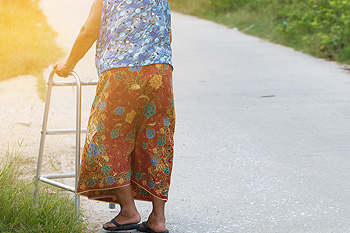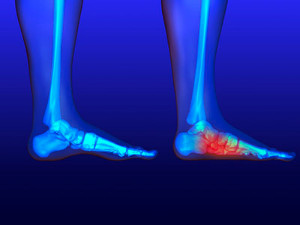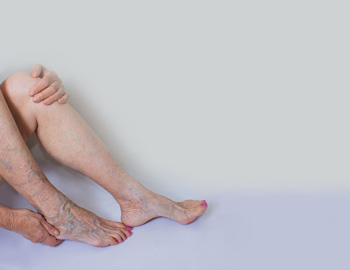 Many elderly patients may experience difficulty in properly taking care of their feet. This may be a result of the inability to bend down and reach them, in addition to the possibility of not being able to see them. The importance of proper foot care as people age is important to practice daily, which may aid in maintaining balance, keeping the feet strong to support the weight of the body, and to possibly walk with ease. Research has shown that many foot conditions may be a result of improper foot care over the course of time, and these may include the formation of bunions, corns, or fungal infections. Diabetes may be a common ailment among the elder population and may often cause unwanted foot conditions. It’s important to wear shoes and socks that fit correctly, have the toenails properly trimmed, and to observe any sores or cuts that are not healing in a timely fashion. Please consult with a podiatrist for additional information about the importance of properly taking care of elderly feet.
Many elderly patients may experience difficulty in properly taking care of their feet. This may be a result of the inability to bend down and reach them, in addition to the possibility of not being able to see them. The importance of proper foot care as people age is important to practice daily, which may aid in maintaining balance, keeping the feet strong to support the weight of the body, and to possibly walk with ease. Research has shown that many foot conditions may be a result of improper foot care over the course of time, and these may include the formation of bunions, corns, or fungal infections. Diabetes may be a common ailment among the elder population and may often cause unwanted foot conditions. It’s important to wear shoes and socks that fit correctly, have the toenails properly trimmed, and to observe any sores or cuts that are not healing in a timely fashion. Please consult with a podiatrist for additional information about the importance of properly taking care of elderly feet.
If you need your feet checked, contact Dr. Tina Oliver of Astro Foot Care, PA. Our doctor will attend to all of your foot and ankle needs and provide you with quality treatment.
Geriatrics and Podiatry
When people age, some common issues that may occur are bone density loss, dry skin, poor circulation, and rough brittle nails. These issues may also affect your foot health if the necessary steps are not taken to alleviate the problems.
It is important to take care of your feet because feet that are injured or diseased can affect your overall health. Having painful feet hinders your ability to do daily activities or may decrease your willingness to do the things that you need to do.
Visiting Your Geriatrician
As we age, health problems become more likely, so it is essential to visit your doctor for check-ups to ensure that you are doing the best you can to take care of your health. It is recommended to check your feet frequently for any possible cuts, bruises, swelling, corns or any other irregularities.
Taking Care of Elderly Feet
Cracked or dry feet can be treated by applying moisturizer often. It is also important not to wear old socks because the older the sock is, the higher the possibility there will be that there is bacteria there. Wear fresh socks and make sure they fit properly.
Proper foot health means that you can have a more active lifestyle and you will not be bogged down by pain. Foot health also leads to good circulation, which is paramount for overall health.
If you have any questions, please feel free to contact our office located in Houston, TX. We offer the newest diagnostic tools and technology to treat your foot and ankle needs.
Read more about Geriatrics and Podiatry If you are experiencing pain and swelling surrounding the nail on the big toe, you may have what is known as an ingrown toenail. Research has shown that when this condition is treated promptly and correctly, many unpleasant and uncomfortable foot conditions may be avoided. These may include a painful infection developing, as well as partial or total removal of the toenail. There are several causes of why this ailment may occur, including improperly cut toenails, wearing shoes and socks that may be too tight, or possible injuries to the toe. Additionally, genetics may play a role in determining the shape of the toenail, which may press more easily into the side of the toenail. Painful symptoms may include bleeding or discharge from the surrounding area of the toenail, severe redness, or swelling. It’s advised to consult with a podiatrist as quickly as possible so the correct treatment options may be discussed.
If you are experiencing pain and swelling surrounding the nail on the big toe, you may have what is known as an ingrown toenail. Research has shown that when this condition is treated promptly and correctly, many unpleasant and uncomfortable foot conditions may be avoided. These may include a painful infection developing, as well as partial or total removal of the toenail. There are several causes of why this ailment may occur, including improperly cut toenails, wearing shoes and socks that may be too tight, or possible injuries to the toe. Additionally, genetics may play a role in determining the shape of the toenail, which may press more easily into the side of the toenail. Painful symptoms may include bleeding or discharge from the surrounding area of the toenail, severe redness, or swelling. It’s advised to consult with a podiatrist as quickly as possible so the correct treatment options may be discussed.
Ingrown toenails can become painful if they are not treated properly. For more information about ingrown toenails, contact Dr. Tina Oliver of Astro Foot Care, PA. Our doctor can provide the care you need to keep you pain-free and on your feet.
Ingrown Toenails
Ingrown toenails occur when a toenail grows sideways into the bed of the nail, causing pain, swelling, and possibly infection.
Causes
Prevention
Because ingrown toenails are not something found outside of shoe-wearing cultures, going barefoot as often as possible will decrease the likeliness of developing ingrown toenails. Wearing proper fitting shoes and using proper cutting techniques will also help decrease your risk of developing ingrown toenails.
Treatment
Ingrown toenails are a very treatable foot condition. In minor cases, soaking the affected area in salt or antibacterial soaps will not only help with the ingrown nail itself, but also help prevent any infections from occurring. In more severe cases, surgery is an option. In either case, speaking to your podiatrist about this condition will help you get a better understanding of specific treatment options that are right for you.
If you have any questions please feel free to contact our office located in Houston, TX. We offer the newest diagnostic and treatment technologies for all your foot and ankle needs.
Read more about Ingrown Toenail Care There are many children who experience low muscle tone in their feet, and this may lead to a condition that is referred to as flat feet. The structure of the foot may be altered, and it may be noticeable if the feet are far apart and turned outward while standing. There are several tendons and ligaments that support the bones of the feet, and those children who are afflicted with flat feet may experience limited stability to the joints of the foot. Additionally, the balance of the body may be negatively affected when these particular muscles are weak, and may generally affect the overall symmetry of the body. Research has shown the tendon that connects the heel to the toes is known as the plantar fascia. This portion of tissue may provide less than adequate support for the arch if low arches in the feet are present. If your child has this condition, it’s suggested to speak with a podiatrist for additional important information relating to flat feet.
There are many children who experience low muscle tone in their feet, and this may lead to a condition that is referred to as flat feet. The structure of the foot may be altered, and it may be noticeable if the feet are far apart and turned outward while standing. There are several tendons and ligaments that support the bones of the feet, and those children who are afflicted with flat feet may experience limited stability to the joints of the foot. Additionally, the balance of the body may be negatively affected when these particular muscles are weak, and may generally affect the overall symmetry of the body. Research has shown the tendon that connects the heel to the toes is known as the plantar fascia. This portion of tissue may provide less than adequate support for the arch if low arches in the feet are present. If your child has this condition, it’s suggested to speak with a podiatrist for additional important information relating to flat feet.
Flatfoot is a condition many people suffer from. If you have flat feet, contact Dr. Tina Oliver from Astro Foot Care, PA. Our doctor will treat your foot and ankle needs.
What Are Flat Feet?
Flatfoot is a condition in which the arch of the foot is depressed and the sole of the foot is almost completely in contact with the ground. About 20-30% of the population generally has flat feet because their arches never formed during growth.
Conditions & Problems:
Having flat feet makes it difficult to run or walk because of the stress placed on the ankles.
Alignment – The general alignment of your legs can be disrupted, because the ankles move inward which can cause major discomfort.
Knees – If you have complications with your knees, flat feet can be a contributor to arthritis in that area.
Symptoms
Treatment
If you are experiencing pain and stress on the foot you may weaken the posterior tibial tendon, which runs around the inside of the ankle.
If you have any questions please feel free to contact our office located in Houston, TX. We offer the newest diagnostic and treatment technologies for all your foot and ankle needs.
Read more about Flat Feet A common reason why tingling and loss of sensation may occur in the feet may be due to peripheral neuropathy. Additional symptoms that patients can notice may be instability in balance, muscle weakness in the feet, or possibly a burning feeling in the surrounding areas of the feet. Research has shown that diabetes plays a significant role as to why this type of neuropathy may be experienced, and is often the result of nerve damage caused by elevated blood sugar levels. There may be other causes of peripheral neuropathy, including viral infections, nerve damage incurred by an injury, or possible side effects from specific medications that may be ingested. Preventative measures for this ailment may include adopting lifestyle changes that may combine limiting the use of alcohol and tobacco. If you are have diabetes, it’s suggested that you seek the counsel of a podiatrist who can properly diagnose your symptoms and begin an effective course of treatment.
A common reason why tingling and loss of sensation may occur in the feet may be due to peripheral neuropathy. Additional symptoms that patients can notice may be instability in balance, muscle weakness in the feet, or possibly a burning feeling in the surrounding areas of the feet. Research has shown that diabetes plays a significant role as to why this type of neuropathy may be experienced, and is often the result of nerve damage caused by elevated blood sugar levels. There may be other causes of peripheral neuropathy, including viral infections, nerve damage incurred by an injury, or possible side effects from specific medications that may be ingested. Preventative measures for this ailment may include adopting lifestyle changes that may combine limiting the use of alcohol and tobacco. If you are have diabetes, it’s suggested that you seek the counsel of a podiatrist who can properly diagnose your symptoms and begin an effective course of treatment.
Neuropathy
Neuropathy can be a potentially serious condition, especially if it is left undiagnosed. If you have any concerns that you may be experiencing nerve loss in your feet, consult with Dr. Tina Oliver from Astro Foot Care, PA. Our doctor will assess your condition and provide you with quality foot and ankle treatment for neuropathy.
What is Neuropathy?
Neuropathy is a condition that leads to damage to the nerves in the body. Peripheral neuropathy, or neuropathy that affects your peripheral nervous system, usually occurs in the feet. Neuropathy can be triggered by a number of different causes. Such causes include diabetes, infections, cancers, disorders, and toxic substances.
Symptoms of Neuropathy Include:
Those with diabetes are at serious risk due to being unable to feel an ulcer on their feet. Diabetics usually also suffer from poor blood circulation. This can lead to the wound not healing, infections occurring, and the limb may have to be amputated.
Treatment
To treat neuropathy in the foot, podiatrists will first diagnose the cause of the neuropathy. Figuring out the underlying cause of the neuropathy will allow the podiatrist to prescribe the best treatment, whether it be caused by diabetes, toxic substance exposure, infection, etc. If the nerve has not died, then it’s possible that sensation may be able to return to the foot.
Pain medication may be issued for pain. Electrical nerve stimulation can be used to stimulate nerves. If the neuropathy is caused from pressure on the nerves, then surgery may be necessary.
If you have any questions, please feel free to contact our office located in Houston, TX. We offer the newest diagnostic and treatment technologies for all your foot care needs.
Read more about Neuropathy